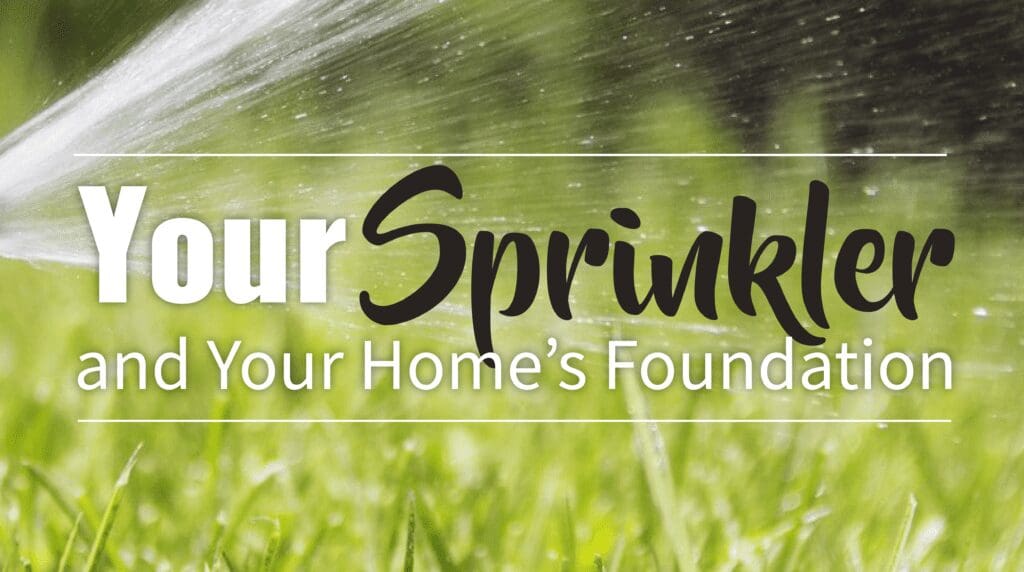A built-in sprinkler system can be a lifesaver for those who want a beautiful, lush lawn during the summer. However, sprinkler systems can also be quite hazardous to the condition of your home’s foundation if not installed and cared for properly. If you have a sprinkler system in place already, there are a few things you need to watch for each season to keep your home healthy and prevent costly foundation repairs.
The Importance of Maintaining Soil Moisture
The key to a healthy home foundation is maintaining the soil around your home at a constant moisture level. It may be surprising to hear, but super dry soil can be just as hard on your foundation as very wet soil. Instead, the goal is to keep your soil moist enough so that it does not expand and contract significantly during changing seasons or weather patterns. If your soil is too dry, it may contract away from your foundation, leaving your home unsupported and potentially causing cracks in the foundation itself, slab on top, and other nearby concrete structures, such as stairs, patios, walkways, and driveways.
To prevent this from happening, you should use a soaker hose, drip line, or drip tape to water your foundation. These products come in different sizes and are flexible enough to fit the footprint of any foundation. They should be installed approximately 12 to 18 inches away from the foundation to be effective.
A word of caution: placing the soaker hose, drip line, or tape too close to your foundation may cause water to accumulate underneath it. When clay soil gets saturated, the excess water will eventually lead to two main problems: first, it may result in mold growth throughout your home; second, the ground beneath your foundation may soften to the point where it loses strength, causing your home to sink into it.
Detect Invisible Sprinkler Leaks to Prevent Foundation Damage
When it comes to foundation watering, soaker hoses, and drip lines are the most common choices made by Houston homeowners. However, some people prefer other options, such as in-ground sprinkler systems, which are more aesthetically pleasing than above-ground systems.
The biggest risk posed by an in-ground sprinkler system is that of an invisible leak, which usually isn’t detected until the damage has already been done. If you also use an in-ground sprinkler system to water your foundation, the best way to prevent invisible leaks from becoming an issue in your home is to closely monitor your monthly water bill for any unexpected spikes in usage. If one of your lines is leaking underground, your water bill will go up before you ever notice that your yard is suffering.
If you do notice a spike in your water bill, it’s time to do a walk around your yard to identify the location of the leak. You will most likely find a soft spot where the grass has overgrown and become soggy. Depending on how long the leak has gone on, the size of this spot can vary. Nevertheless, you will want to turn off your sprinkler supply line to prevent any future flooding from reaching your home’s foundation. Aside from the risk of water causing mold to grow, there are a few other complications associated with flooding. One of them is heaving, which will cause the ground to swell and sink in different locations. This action will eventually lead to differential settlement, which may lead to structural damage throughout your house.
Foundation Repair in Greater Houston Area
If a leak has turned into foundation damage, you will need to prepare for some extensive work to be done under your house. This typically involves digging tunnels and using a series of jacks to lift the foundation back into place and support it. There are a few different ways this can be done depending on the type of soil beneath your foundation. However, once the foundation has been lifted, it will be repaired and resealed to prevent water from finding its way inside the structure again. Whether you have a slab-on-grade or pier-and-beam foundation, our foundation repair specialists will know which course of action to take to fix the damage.
But even though our professionals can repair any type of foundation, don’t let your sprinkler system adversely affect your home this year! Make sure that it is winterized properly in the fall to protect against Houston’s unreliable winters, and do a careful test run in the spring before you turn it on for Houston’s hot summer days. By inspecting your sprinkler system in the spring, you’ll be able to prevent any leaks that could otherwise occur, so they wouldn’t turn into a cause for foundation repair. If you are installing a new sprinkler system, make sure to ask about the best ones for foundation watering. For more helpful information about protecting your home’s foundation, get in touch with us today! We’re ready to answer all of your questions and also inspect your foundation for free, if necessary!

